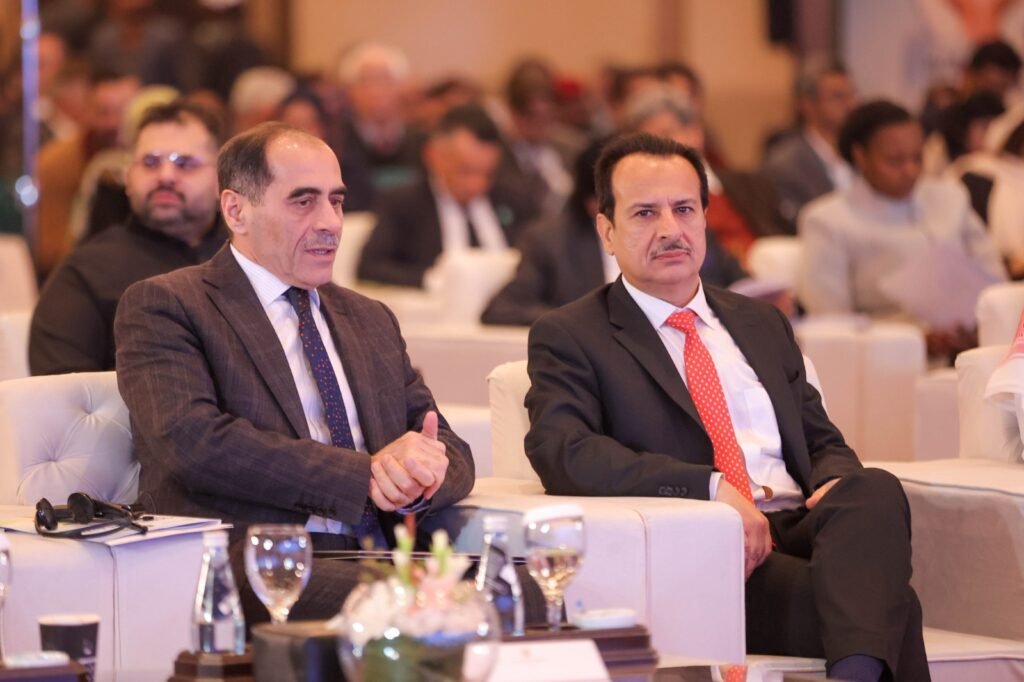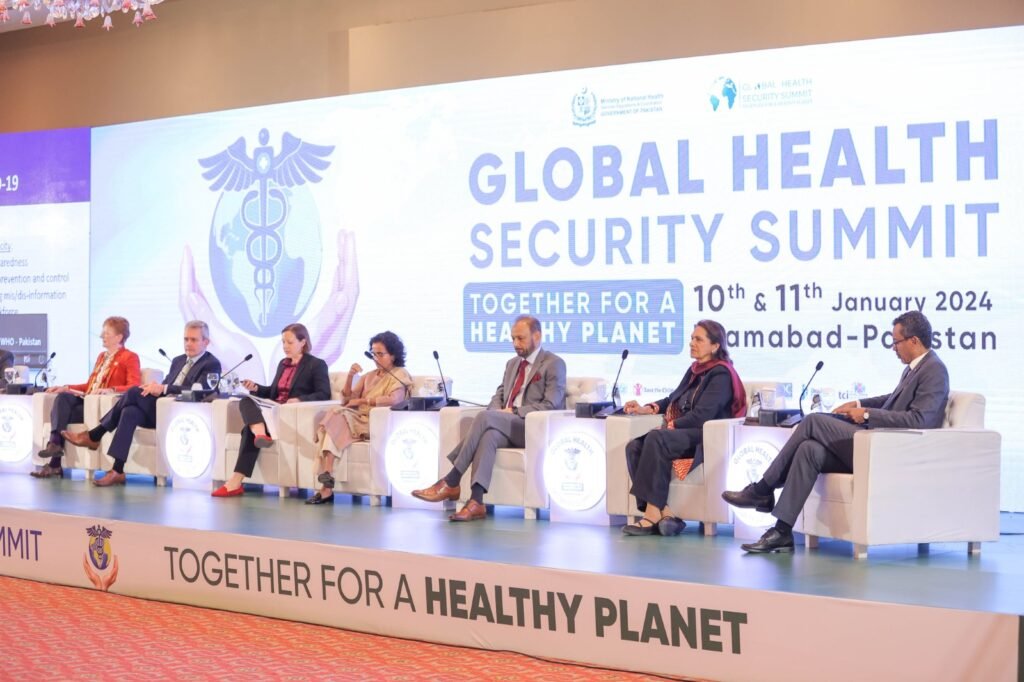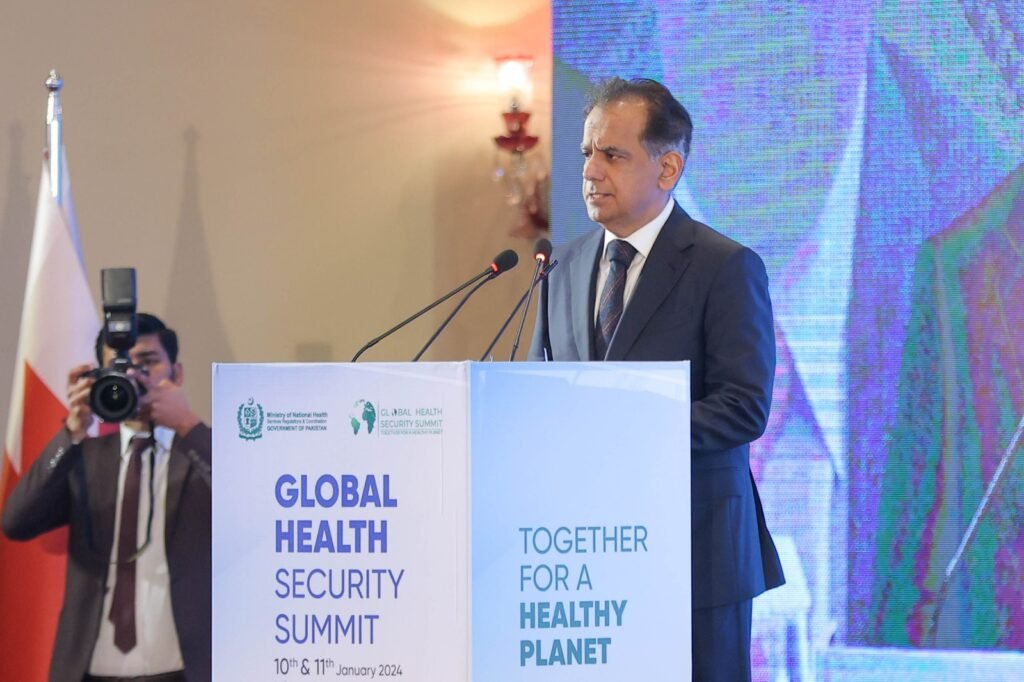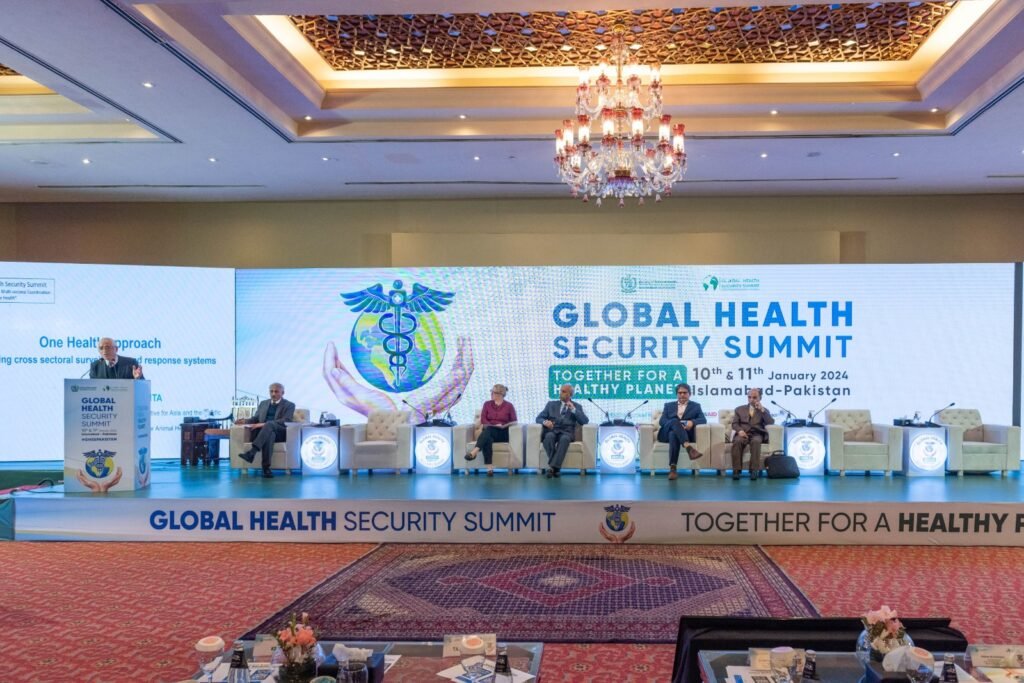Islamabad : The Global Health Summit, a two-day event with health ministers from countries, health experts and stakeholders from around the world, concluded with a resounding commitment to a unified, coordinated response to emerging health challenges. The summit provided a platform for insightful discussions, knowledge exchange, and the establishment of collaborative initiatives to strengthen global health security.
The summit presented determination and shared vision among nations, transcending geopolitical boundaries in the pursuit of a common goal. Discussions covered a wide spectrum of topics, from collaborative preparedness to the critical role of resilient health systems. Delegates representing diverse corners of the globe shared invaluable insights, emphasizing the interconnectedness of our shared destiny.

The Federal Minister for NHSRC congratulated the participating delegates and participants to make this Summit a successful event. “Beyond national interests, we are partners for a common goal – to ensure the health of all,” said the Minister Dr. Nadeem Jan at the conclusion of the Summit.

During his remarks, the health minister Dr. Nadeem Jan proposed to introduce a Global Health Security Agenda Champion Awards to be bestowed upon the countries/ individuals based on their exemplary contributions to the cause. He also proposed the inclusion of a dedicated special session on global health security in both the annual UNGA and World Health Assembly agendas. This would provide a regular platform for nations to review progress, share insights, and discuss emerging health challenges on a global scale. A comprehensive 5-years global action plan was proposed to guide nations in implementing strategies for enhancing health security.

“As we conclude this summit, let it not be an endpoint but a launchpad and beginning of the end. Commitments made here must translate into concrete actions in our respective nations. Implementation is the litmus test of our dedication to the ideals espoused during these deliberations,” urged Minister Dr. Nadeem Jan.
Federal Secretary Mr. Iftikhar Ali Shalwani expressed his joy, stating that it was a “dream come true” to witness the collaborative efforts of policy makers, experts, policymakers, and stakeholders from around the world. He emphasized the need for continued collaboration, and the implementation of evidence-based strategies to safeguard global health. In his address, he underscored the importance of the summit as a platform for forging partnerships and creating a roadmap for collective action.

Dr. Muhammad Ahmed Kazi, Director General of Health, expressed sincere gratitude to distinguished guests, esteemed colleagues, and participants for their active engagement throughout the summit. He also summarized the main highlights of the two day proceedings of the Summit.
On the Pandemic Preparedness & Response, experts emphasized the urgent need to enhance global capacities for prevention, detection, and response. On the climate Change and Emerging Public Health Threats, A One Health System Approach and harmonization of technological innovations with health systems were recognized as pivotal in addressing climate-induced health threats. The Ministry of Climate Change was acknowledged as a bridge facilitating collaborations. On the multi-sectoral Coordination in the Context of “One Health”, the recommendations included developing zoonotic disease surveillance programs, promoting increased coordination, introducing artificial intelligence for disease surveillance, and institutionalizing One Health efforts through a dedicated secretariat. On the topic of Sustainable Financing and Global Health Security, the summit called for advocating health systems financing, prioritizing equity in vaccine distribution, promoting sustainable financing through public-private partnerships, and emphasizing the importance of investing in preparedness.

While towards the end, on the topic of the Impact of Global Health Security on National Security, member states were urged to prioritize health security as part of the public health agenda, maintain core capacities gained during COVID-19, and address antimicrobial resistance (AMR) through a cross-sectoral approach.
In closing, heartfelt appreciation was extended to every delegate, expert, and representative for contributing to the success of this summit. The summit was referred to as a beacon, illuminating the path toward a world where health is an unassailable right for every citizen.
Let us march forward together in the pursuit of global health security. As we have shown solidarity for a healthy planet, we will always be ‘Together,’ and you will find Pakistan as your friend, your support, your voice – that’s what Pakistan stands for, Minister reiterated.
Towards the end, Federal Secretary Mr. Iftikhar Shalwani presented the main features of the declaration agreed upon by the participants. The declaration outlines key commitments and action points that will guide future initiatives in the realm of global health security.
All partners and stakeholders to expeditiously facilitate the following actions at the national and sub-national levels, taking into account local and national contexts, needs, and priorities:
● Development and strengthening of public health functions under IHR 2005 to build countries’ capacities and for early detection of outbreaks through efficient surveillance systems coupled with robust response mechanisms to control disease outbreaks at their source;
● Scaling up efforts to strengthen national and international cooperation at the highest possible levels that ensure timely, sustainable, and equitable access to quality, safe, effective, affordable, and essential health services, vaccines, medicines, commodities, diagnostics, health technologies, and therapeutics products;
● Expansion of coverage of quality, safe, effective, affordable, accessible, and integrated essential health services based on PHC and UHC by improving infrastructure, increasing workforce availability and productivity, and availability of essential medicines, supplies, and health technologies, while considering equitable distribution and efficient resource use;
● Enhance political ownership at all levels towards national health security by strengthening and integrating information and disease surveillance and response systems, undertaking regular assessments at national and sub-national levels, advancing research and the application of digital health, and conducting periodic external evaluations;
● Development of synergies among UHC, health security, and health well-being through strong governance at all levels, policy and programmatic reforms, and legislation, to ensure quality services for all including vulnerable groups residing within national territories that include hard-to-reach communities as well as marginalised populations;
● Incorporating evidence-informed policy options for climate adaptation and mitigation strategies, thereby enabling governments to prevent or reduce the health risks associated with climatic change and environmental degradation;
● Enhanced domestic financing, as appropriate, for essential health services and public health functions to improve national health security as well as financial assistance by development partners as a catalyst towards financial sustainability, transparency, and responsiveness;
All partners and stakeholders to expeditiously facilitate actions at the global level that include:
● Establish a high-level advocacy forum on a voluntary basis to champion the cause of global health security. The forum will meet on an annual basis to review the status, deliberate and future strategic direction for countries, institutions, and organisations;
● Institute WHO-led pandemic agreement by the inter-governmental negotiating body, based on Equity and Global Solidarity to foster international cooperation to strengthen pandemic prevention, preparedness, response, and health systems recovery, with the understanding that no one is safe until everyone is safe;
● Establish a sustainable post-emergency pandemic financing mechanism with pooling of funds and immediate disbursement of funds to developing countries in an emergency, and meeting agreed triggers and disbursement linked indicators;
● Foster consensus for institutional reforms related to multiple vertical international financing streams for sustainable, government-led, integrated health services and public health functions.











